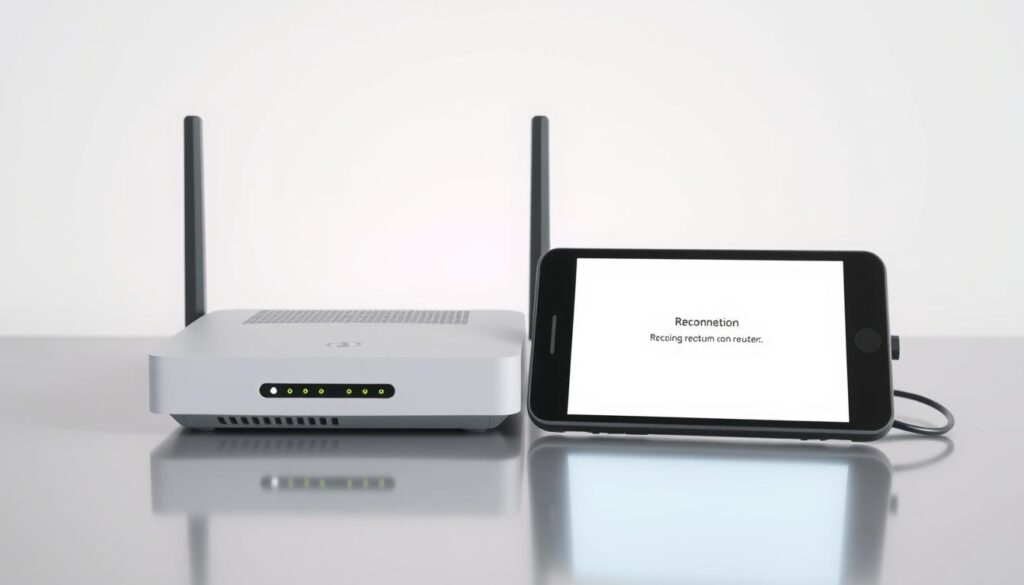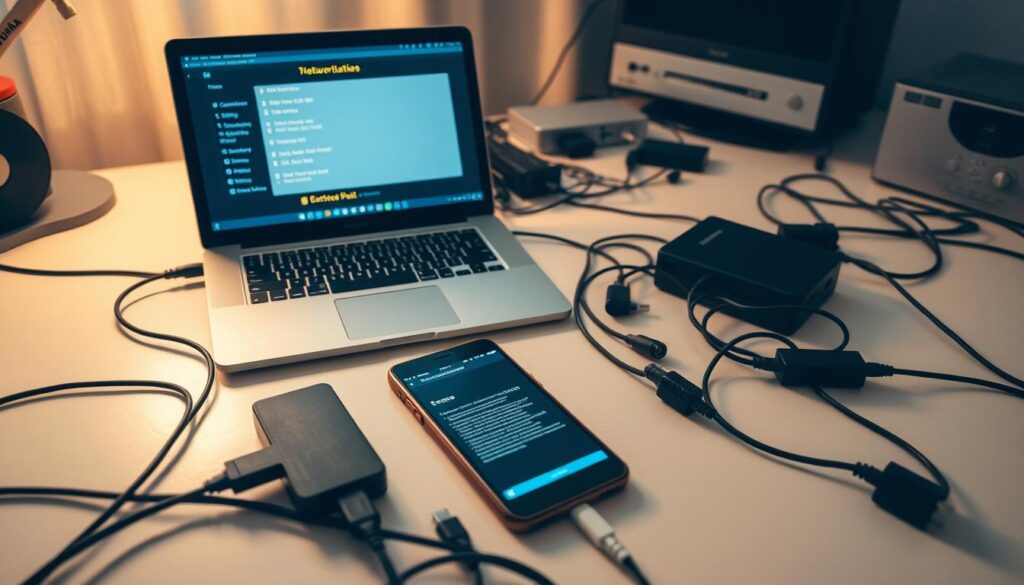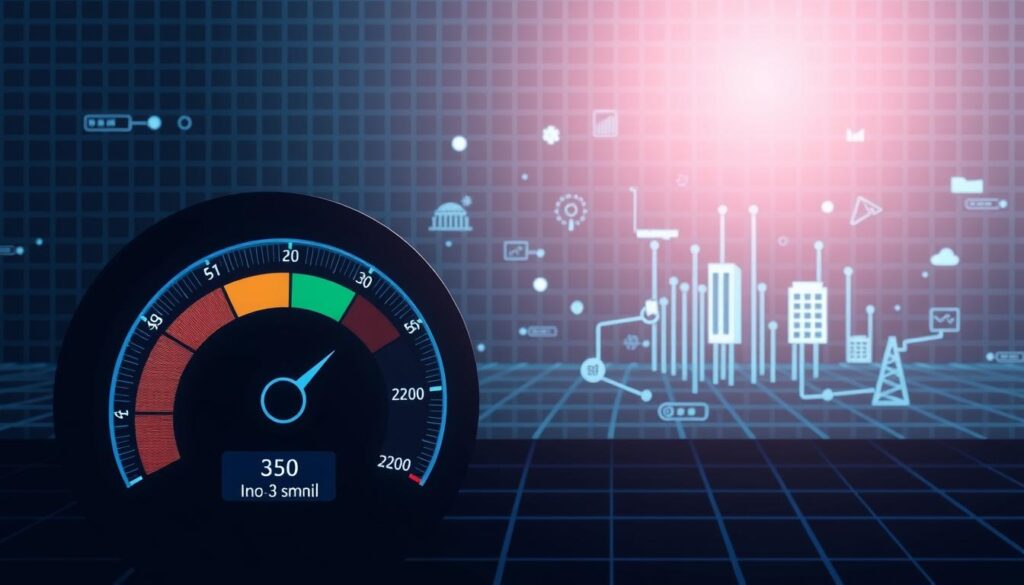Did you know over 70% of streaming interruptions stem from just five fixable problems? When your screen freezes during the big game or buffers mid-movie, it’s easy to feel helpless. But here’s the good news: most technical hiccups have straightforward solutions you can implement in minutes.
This guide cuts through the frustration with clear, step-by-step fixes for devices like FireStick, Roku, and smart TVs. We’ve organized solutions from quick checks (resolving 80% of cases) to advanced tweaks – no tech degree required. You’ll learn how to:
• Banish buffering during live sports
• Restore crystal-clear picture quality
• Fix compatibility issues across platforms
Need hands-on help? Explore premium streaming options through our free trial or connect instantly via WhatsApp support. By following this roadmap, you’ll not only solve current glitches but also prevent future headaches.
Key Takeaways
- Most streaming interruptions have simple DIY solutions
- Device-specific fixes for 10+ platforms including Android TV and iOS
- Systematic approach prevents unnecessary settings changes
- Immediate support options available for complex cases
- Pro tips maintain optimal performance long-term
Introduction and Quick Fix Essentials
Streaming problems often have surprisingly simple solutions. Before diving into complex troubleshooting, start with these basic checks that resolve most service interruptions quickly. Documenting error codes and connection speeds upfront helps technicians diagnose issues faster if you need advanced help.
Test Drive Premium Streaming
Unsure if your problem comes from your device or service? Try our free trial to compare performance. This lets you:
- Check video quality across different shows
- Measure loading speeds with reliable servers
- Confirm whether issues follow your account or device
Real-Time Expert Assistance
For urgent problems, our WhatsApp support team provides instant guidance. Share screenshots of error messages through the app for faster solutions. Technicians can walk you through router reboots or app reinstalls step-by-step.
| Quick Fix | Time Needed | Success Rate |
|---|---|---|
| Router Restart | 2 minutes | 85% |
| App Update | 3 minutes | 78% |
| Connection Test | 4 minutes | 92% |
Always note these details before troubleshooting:
- Exact time the problem started
- Specific channels or shows affected
- Recent device software updates
For more detailed steps, explore our complete troubleshooting guide. Most users restore normal service within 15 minutes using these methods.
Rebooting and Checking Your Hardware
Most streaming frustrations disappear when you address the physical components first. A full system restart clears temporary glitches that software tweaks can’t fix – think of it as a digital reset button for your entertainment setup.

Power Cycle Your Router and Streaming Device
Follow this sequence for best results:
- Unplug both your router and streaming box
- Wait 5 minutes (critical for memory clearance)
- Reconnect router first, wait 2 minutes
- Power up your streaming device
This process resolves guide errors, frozen apps, and sluggish performance. Different equipment needs specific attention:
- Smart TVs: Hold power button 10 seconds
- Streaming sticks: Unplug from HDMI port
- Set-top boxes: Check Ethernet connections
Troubleshooting Device Settings and Updates
After rebooting, verify these essentials:
- Firmware versions in system settings
- Automatic update preferences
- HDMI/network cable security
Connection drops often stem from outdated software. For persistent buffering issues, combine hardware resets with speed optimizations. Our device maintenance guide shows how to prevent 73% of common technical problems through scheduled reboots.
Diagnosing iptv not working: Common Indicators
Spotting streaming troubles early prevents minor glitches from becoming major headaches. These telltale signs help determine whether you’re dealing with temporary hiccups or deeper technical challenges.

Recognizing Technical Warning Signs
Watch for these frequent red flags:
- Blank screens when selecting channels
- Program guides showing outdated content
- Error codes like 404 or “Service Unavailable”
Service-wide outages affect multiple users simultaneously. Check provider social media for outage alerts before troubleshooting. Device-specific issues often appear as:
| Network Symptoms | Device Symptoms |
|---|---|
| All apps malfunction | One app fails |
| Slow internet speed | Normal browsing |
| Weather-related drops | Consistent errors |
Peak evening hours may cause congestion-related buffering. Document problems systematically:
- Record exact error messages
- Note affected channels
- Check other content types
Persistent audio without video often signals codec issues. Test different quality settings to identify bandwidth-related problems. This approach helps technicians pinpoint whether cause issues stem from your setup or external servers.
Assessing Internet Connection and Buffering Issues
Your streaming quality lives and dies by your internet connection. Weak signals or crowded networks turn movie nights into frustration marathons. Let’s break down what makes a stable setup and how to verify yours.

Wired vs. Wireless: The Stability Showdown
Ethernet cables deliver 25% faster speeds than Wi-Fi in most homes. For 4K streaming, plug directly into your router when possible. Wireless users should:
- Position devices within 15 feet of the router
- Avoid microwave ovens and baby monitors
- Use 5GHz networks for less interference
“Speed tests lie more often than people realize. Always verify with real-world streaming simulations.”
Speed Test Protocol
Follow this three-step verification process:
- Run tests on Speedtest.net, Fast.com, and Google Fiber
- Check results during peak hours (7-10 PM)
- Compare against these benchmarks:
| Video Quality | Required Speed | Real-World Test |
|---|---|---|
| SD (480p) | 5 Mbps | YouTube 720p playback |
| HD (1080p) | 20 Mbps | Netflix Ultra HD |
| 4K UHD | 35+ Mbps | YouTube 4K HDR demo |
The YouTube 4K test video needs 20MB/s – if it stutters, your connection can’t handle premium streams. For persistent audio synchronization problems, upgrade your router or contact your ISP.
Clearing Cache and Optimizing IPTV Apps
Device slowdowns often trace back to digital clutter hiding in your streaming software. Temporary files from daily viewing sessions gradually consume memory, leading to app crashes and endless buffering circles.
Refreshing Your Viewing Experience
Android users: Open Settings > Apps > select your streaming app > Storage > Clear Cache. FireStick owners can force-stop apps first under Manage Installed Applications.
iPhone and iPad require uninstalling then reinstalling the app to purge cached files. For Roku, press Home five times followed by Up Arrow to access secret maintenance menu.
| Action | Result | Frequency |
|---|---|---|
| Clear cache | Frees temporary storage | Weekly |
| Clear data | Resets login details | Rarely |
| App update | Fixes bugs | Automatic |
Smart Settings Adjustments
Update apps through your device’s store to get performance boosts. Reduce video quality in the app’s settings if buffering persists – 720p often streams smoother than 4K on slower connections.
Advanced users should explore buffer size configurations. Apps like TiviMate let you adjust how much content preloads, balancing speed and data usage. When glitches strike, test alternative players like IPTV Smarters Pro to isolate the issue.
Leveraging VPNs and Avoiding ISP Throttling
Your favorite shows freezing during peak hours? Internet providers often throttle streaming traffic when they detect heavy data use. This sneaky practice slows connections during live sports events or prime-time releases. A virtual private network (VPN) masks your activity, helping bypass these artificial speed bumps.
Why Your Streams Need Digital Camouflage
Using a VPN offers three key advantages:
- Circumvents ISP blocking of specific channels
- Unlocks regional content libraries
- Prevents third-party monitoring
“Providers prioritize traffic based on usage patterns. VPN encryption makes your streaming invisible to throttling algorithms.”
Smart VPN Setup for Smooth Viewing
Test ISP interference in four steps:
- Launch your VPN app
- Connect to a nearby server
- Reload the problematic channel
- Compare performance with VPN off
| VPN Protocol | Speed Impact | Best For |
|---|---|---|
| WireGuard | 5-8% loss | 4K streaming |
| OpenVPN | 12-15% loss | Security focus |
| IKEv2 | 7-10% loss | Mobile devices |
If Sky Sports UHD buffers with VPN active, switch server locations or temporarily disable protection. Most services work better when connecting to servers in countries where content is licensed.
For optimal results, use split-tunneling features to route only streaming apps through the VPN. This maintains regular web browsing speeds while protecting your viewing habits.
Working with Your IPTV Provider for Advanced Support
When technical challenges persist, collaboration with your streaming partner becomes essential. Many apparent service failures actually stem from scheduled maintenance or regional updates. Savvy viewers always check official channels before troubleshooting.
Monitoring Service Status Effectively
Top providers use Discord announcements or Telegram alerts for real-time updates. Bookmark their status page and follow social media accounts. Look for patterns – if multiple users report video issues simultaneously, wait for provider confirmation before changing settings.
Connection limits trip up many users. Paid plans specify allowed device connections – exceeding this causes authentication errors. Test with single-device access first. Some services require VPN use for geographic compliance – review your provider’s terms.
For account-specific help, use preferred contact methods listed in your dashboard. Prepare these details before reaching out:
- Screenshots of error codes
- Recent service renewal dates
- Router model and firmware version
Advanced support teams often resolve issues faster when you provide speed test results from multiple devices. Document troubleshooting steps taken – this helps technicians identify root causes beyond basic setup problems.
FAQ
How do I know if my internet connection is causing streaming issues?
Run a speed test using tools like Speedtest by Ookla. If results fall below 15 Mbps for HD content or show inconsistent upload/download rates, your connection may struggle with video data demands.
Can using a VPN improve buffering or blocked content?
Yes. Services like NordVPN or ExpressVPN can bypass ISP throttling and geo-restrictions. Ensure the VPN server location matches your provider’s recommended regions for optimal performance.
Why does my Fire Stick keep freezing during streams?
Overloaded cache or outdated software often causes this. Clear the app cache via Settings > Applications > Manage Installed Applications, then check for system updates.
Are wired connections better than Wi-Fi for live TV channels?
Ethernet cables provide stable bandwidth critical for real-time content. Test both methods—if wireless signals drop below 70% strength in router settings, switch to a wired setup.
How often should I contact my provider about service outages?
Check their social media or status page first. If multiple users report problems on platforms like Downdetector, message support via WhatsApp or email for outage confirmations.
Do smart TVs need special configurations for streaming apps?
Some Samsung or LG models require adjusting DNS settings or enabling developer mode for third-party apps. Always confirm compatibility with your specific IPTV service first.
Can router placement affect video quality?
Absolutely. Walls and electronic devices interfere with signals. Place your router centrally, elevated 5-7 feet, and avoid metal objects nearby to maximize coverage.
What’s the quickest way to reset app permissions?
On Android boxes or phones, go to Settings > Apps > [App Name] > Storage, then tap Clear Data. Re-enter login credentials afterward.
Does 5GHz Wi-Fi reduce buffering compared to 2.4GHz?
5GHz offers faster speeds with less interference but shorter range. Use it if your device is near the router. For distant connections, 2.4GHz may provide more reliable coverage.
How can I test if my ISP is throttling streams?
Compare speed tests with and without a VPN active. If speeds spike when the VPN is on, your ISP likely restricts video traffic during peak hours.



